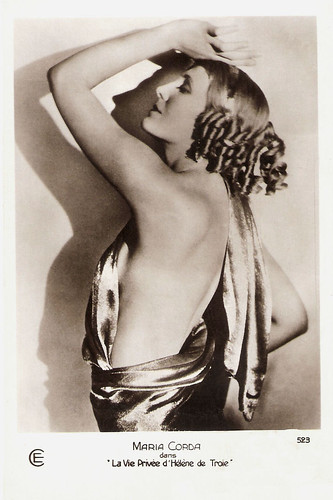
French postcard by Editions Cinémagazine, no. 523. Publicity still for The Private Life of Helen of Troy (Alexander Korda, 1927).
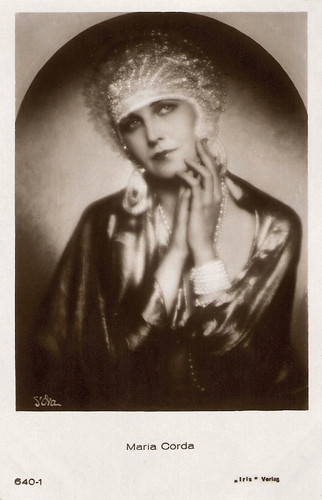
Austrian postcard by Iris Verlag, no. 640-1. Photo: d'Ora.
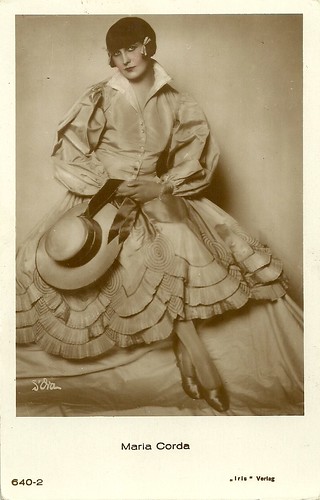
Austrian postcard by Iris Verlag, no. 640-2. Photo d'Ora.
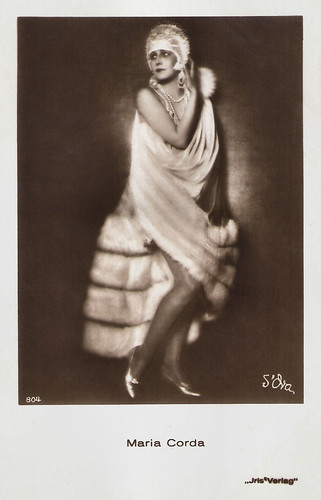
Austrian postcard by Iris Verlag, no. 804. Photo: d'Ora.
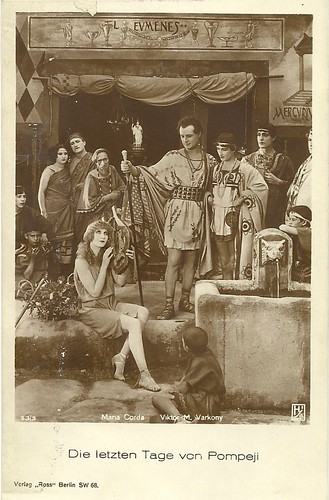
German postcard by Ross Verlag, no. 53/3. Photo: Hisa. Publicity still for Gli ultimi giorni di Pompei/The Last Days of Pompeii (Carmine Gallone, Amleto Palermi, 1926). Collection: Didier Hanson.

French postcard by Europe, no. 315. Photo: Mercure Film. Maria Corda as Helen of Troy in The Private Life of Helen of Troy (Alexander Korda, 1927).
The Slave Queen
María Corda (sometimes spelt as Korda) was born María Antónia Farkas in Déva, Hungary in 1898. She began her acting career in the theatres of Budapest in the early days of World War I. Soon after Hungary became an independent state she began to work in the film industry as well.
As Antónia Farkas she made her first film appearance in Se ki, se be/Not In, or Out (Sándor Korda aka Alexander Korda, 1919). In 1919 she married her director, but she would always write her last name differently to differentiate herself from her husband. He featured her in Fehér rózsa/The White Rose (Alexander Korda, 1919), Ave Caesar! (Alexander Korda, 1919) and A 111-es/Number 111 (Alexander Korda, 1919).
She followed Korda when he journeyed to Vienna to join the Sascha Film Company. There Korda made her a star of the European silent cinema. Under his guidance, she took part in epic films like Samson und Delila/Samson and Delilah (Alexander Korda, 1922) and Die Sklavenkönigin/The Slave Queen (Mihály Kertész aka Michael Curtiz, 1924).
Set in ancient Egypt, Die Sklavenkönigin recounts the oppression of the Jews under the despotic rule of Pharaoh Menapta. Against this backdrop is played the romantic story of Hebrew girl Merapi (Maria), the ‘Moon of Israel’, and Prince Seti (Adelqui Migliar aka Adelqui Millar), heir to the Egyptian throne.
Die Sklavenkönigin was intended for an American release that same year, under the title Moon of Israel. That release was suppressed by Cecil B. DeMille, who worried that his own The Ten Commandments would be compared unfavourably. In 1927 Moon of Israel finally arrived in the American cinemas, director Michael Curtiz had been hired by Warner Bros., largely on the strength of this one film.

Romanian postcard. Photo: Dorian-Film. Maria Corda and Adelqui Migliar in Die Sklavenkönigin/The Moon of Israel (Mihaly Kertesz aka Michael Curtiz, 1924).
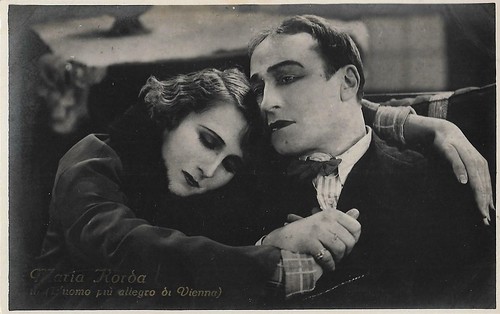
Italian postcard by G.B. Falci, Milano, no. 349. Photo: Palermi Films / La Fotominio. Maria Corda and Ruggero Ruggeri in L'uomo più allegro di Vienna/The Most Cheerful Man in Vienna (Amleto Palermi, 1925).

Italian postcard by G.B. Falci, Milano, no. 352. Photo: Fotolux / Palermi Films. Maria Corda in L'uomo più allegro di Vienna/The Most Cheerful Man in Vienna (Amleto Palermi, 1925).

Italian postcard by Ed. A. Traldi, Milano. Maria Corda (probably)in L'uomo più allegro di Vienna/The Most Cheerful Man in Vienna (Amleto Palermi, 1925).

Italian postcard by C. Chierichetti, Milano. Photo: Grandi Films, Roma. Maria Corda as Nydia in Gli ultimi giorni di Pompei/The Last Days of Pompeii (Carmine Gallone, Amleto Palermi, 1926).

Italian postcard by C. Chierichetti, Milano. Photo: Grandi Films, Roma. Victor Varconi as Glaucus and Maria Corda as Nydia in Gli ultimi giorni di Pompei/The Last Days of Pompeii (Carmine Gallone, Amleto Palermi, 1926).
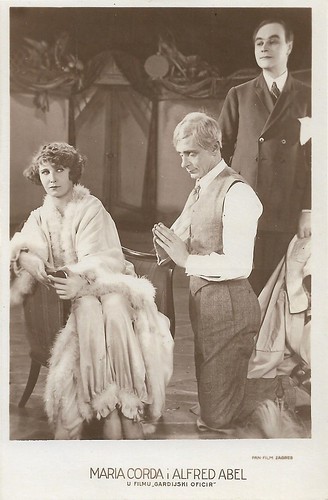
Former Kingdom of Yugoslavia (Croatian) postcard by Jos. Caklovic, Zagreb, no. 59. Photo: Pan Film, Zagreb. Maria Corda and Alfred Abel in the German film Der Gardeoffizier/The Guardsman (Robert Wiene, 1927), based on the play 'A testör' by Ferenc Molnár. The man kneeling and begging for forgiveness is Abel. The man in the back may be Anton Edthofer, who plays a critic.

Former Kingdom of Yugoslavia (Croatian) postcard by Jos. Caklovic, Zagreb, no. 62. Photo: Pan Film, Zagreb. Maria Corda in Der Gardeoffizier/The Guardsman (Robert Wiene, 1927).
Box Office Queen
In the mid-1920s, Maria Corda had become a darling of the public and a sure guarantee for success at the box office. To her hits belong Das unbekannte Morgen/The Unknown Tomorrow (Alexander Korda, 1923) with Werner Krauss, Jedermanns Frau/Everybody's Woman (Alexander Korda, 1924), and Madame wünscht keine Kinder/Madame Doesn't Want Children (Alexander Korda, 1926) with Harry Liedtke.
Her popularity was so huge that Austrian investors refused their grant for the Italian film Gli ultimi giorni di Pompei/The Last Days of Pompeii (Carmine Gallone, Amleto Palermi, 1926) unless the leading part would be recast with Maria Corda. And of course, that’s what finally happened.
Desperately seeking his independence, Alexander Korda moved to Berlin to form his own company Korda-Film, and Maria moved with him to the German capital. There Korda directed his wife in Eine DuBarry Von Heute/A Modern DuBarry (Alexander Korda, 1926).
Corda played Toinette, a saucy, somewhat amoral scullery maid. Bouncing from bed to bed, Toinette becomes the mistress of Count Martel (Alfred Gerasch) and, ultimately, the King of Andalia (Jean Bradin).
This final liaison very nearly topples the Andalian government, but Toinette manages to survive this ordeal without a hair out of place, though she does cry and cry a lot when things don't go her way. This film landed Korda his Hollywood contract, and he and Maria travelled to the US.
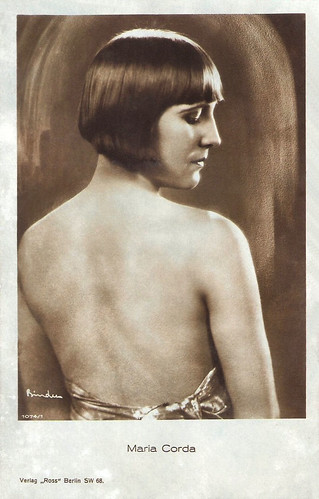
German postcard by Ross Verlag, no. 1074/1, 1927-1928. Photo: Alex Binder.

German postcard by Ross Verlag, no. 1074/4, 1927-1928. Photo: Alex Binder.
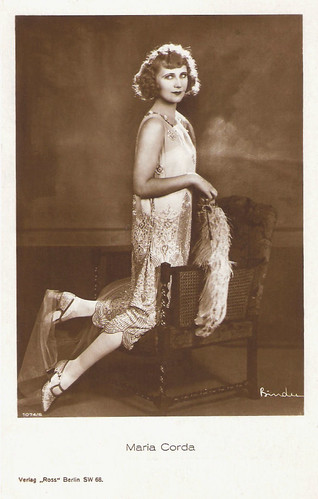
German postcard by Ross Verlag, no. 1074/6, 1927-1928. Photo: Alex Binder.
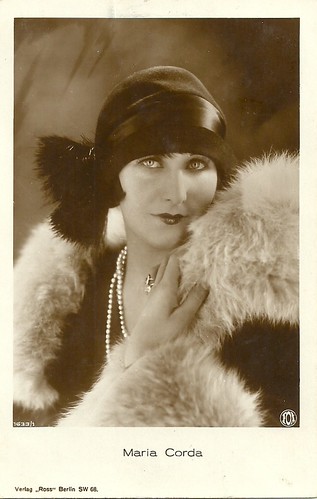
German postcard by Ross Verlag, no. 1633/1, 1927-1928. Photo: Fox.
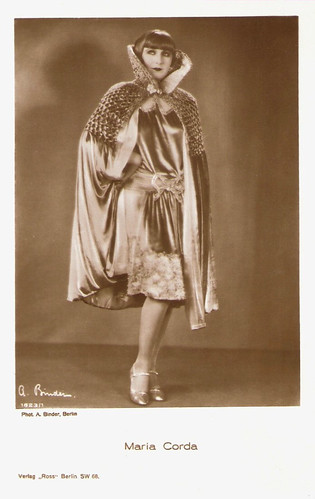
German postcard by Ross Verlag, no. 1823/1, 1927-1928. Photo: Alex Binder.

German postcard by Ross Verlag, no. 3397/2, 1928-1929. Photo: Defina / First National.
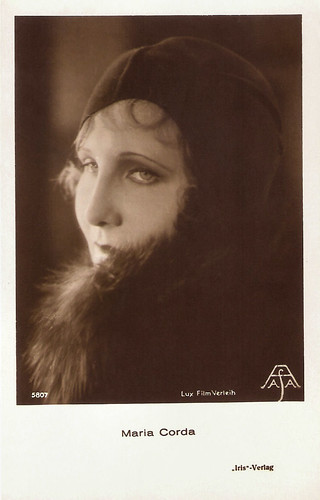
Austrian postcard by Iris Verlag, no. 5807. Photo: Lux Film Verleih / Aafa.
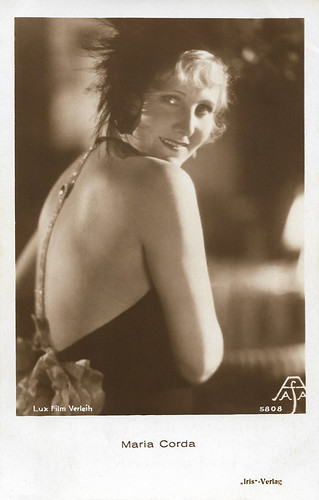
Austrian postcard by Iris Verlag, no. 5808. Photo: Lux Film-Verleih / Aafa.
Oblivion
Maria Corda’s one truly successful Hollywood film performance was in The Private Life of Helen of Troy (Alexander Korda, 1927). Setting the standard for his later light-hearted biopics The Private Life of Henry VIII and Rembrandt, Korda steadfastly refused to take any of The Private Life of Helen of Troy seriously.
Maria Corda played the title character as a fetchingly underdressed coquette, oblivious to all the political turmoil she's causing when she allows the handsome Paris (Ricardo Cortez) to kidnap her. The film was nominated for an Academy Award in 1928, the year of the Awards' inception, in the category of Best Title Writing.
Other Hollywood productions with Corda like the early sound film Love and the Devil (Alexander Korda, 1929) enjoyed little success. She finished her Hollywood career when the sound came to stay because her English was limited.
She returned to Europe where she appeared in the silent comedies Der moderne Casanova/A Modern Casanova (Max Obal, 1928) and Die Konkurrenz platzt/The Competition Bursts (Max Obal, Rudolf Walther-Fein, 1929), both opposite Harry Liedtke.
In Germany, she made one more sound film: Rund um die Liebe/All Around Love (Oskar Kalbus, 1929) with Elisabeth Bergner. In 1930 Maria Corda divorced Alexander Korda and she would never make another film.
She moved to New York where she wrote novels. The formerly celebrated film goddess fell into oblivion. The later years of her life were spent in the vicinity of Geneva, Switzerland. Maria Corda died there in Thônex in 1976. She was 77.
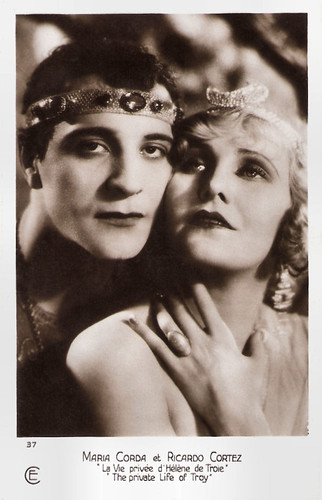
French postcard by Cinémagazine-Edition, no. 37. Photo: publicity still for The Private Life of Helen of Troy (Alexander Korda, 1927) with Ricardo Cortez.
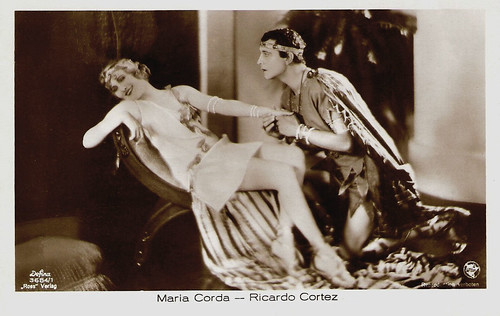
German postcard by Ross Verlag, no. 3684/1, 1928-1929. Photo: Defina. With Ricardo Cortez in The Private Life of Helen of Troy (Alexander Korda, 1927).
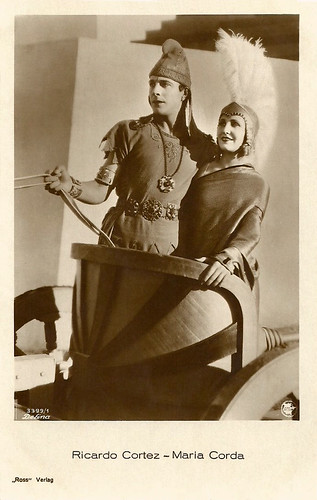
German postcard by Ross Verlag, no. 3399/1, 1928-1929. Photo: Defina. Publicity still of Maria Corda and Ricardo Cortez as Helena and Paris in The Private Life of Helen of Troy (Alexander Korda, 1927).
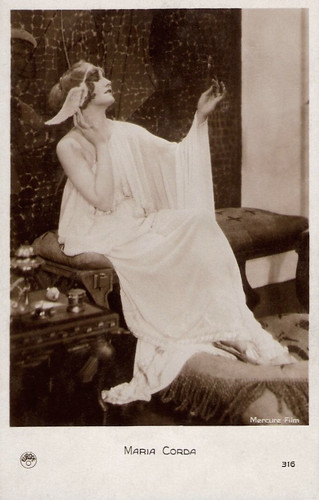
French postcard by Europe, no. 316. Photo: Mercure Film.
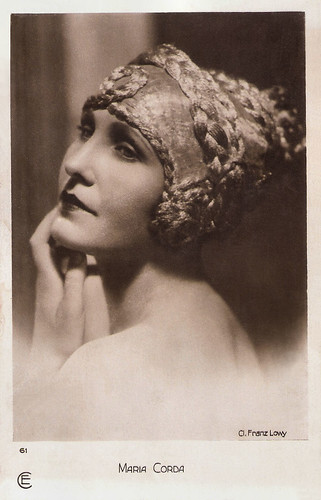
French postcard by Cinémagazine-Edition, no. 61. Photo: Franz Lowy.
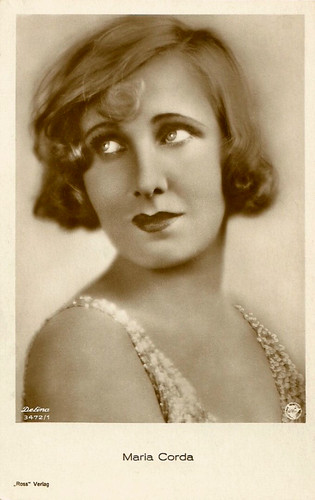
German postcard by Ross Verlag, no. 3472/1, 1928-1929. Photo: Defina.
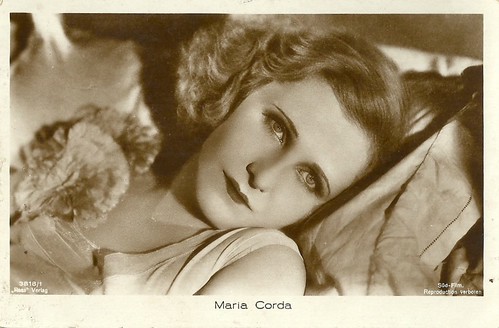
German postcard by Ross Verlag, no. 3818/1, 1928-1929. Photo: Süd-Film.
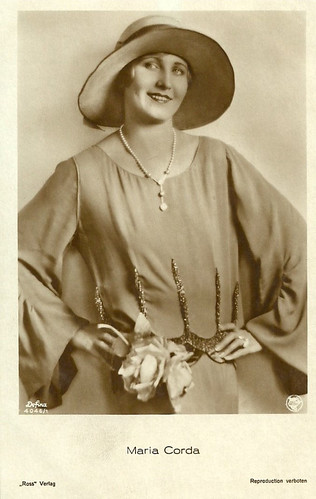
German postcard by Ross Verlag, no. 4046/1, 1929-1930. Photo: Defina.

German postcard by Ross Verlag, no. 4368/1, 1929-30. Photo: Defina / First National. Back of the card: Casa Editrice Ballerini & Fratini, Firenze.
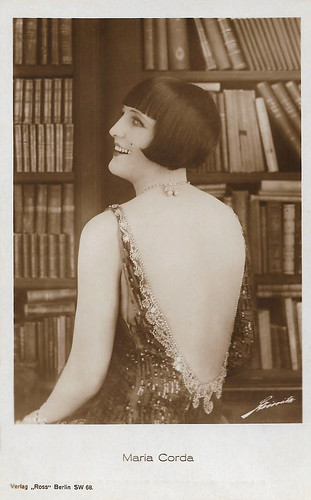
German postcard by Ross Verlag, no. 4555/1 (?), 1929-1930. Back of the card: ink stamp of Casa Editrice Ballerini & Fratini, Firenze.
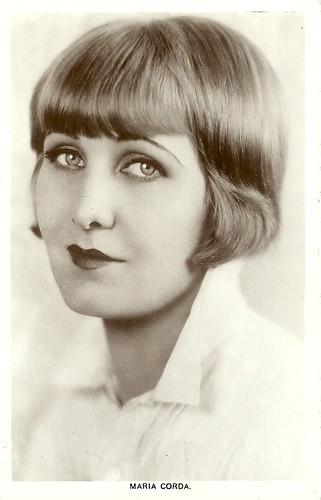
British postcard in the Picturegoer Series, London, no. 347.
Sources: Thomas Staedeli (Cyranos), Hal Erickson (AllMovie), J. A. Aberdeen (Hollywood Renegades Archives), Allure, Wikipedia and IMDb.
No comments:
Post a Comment